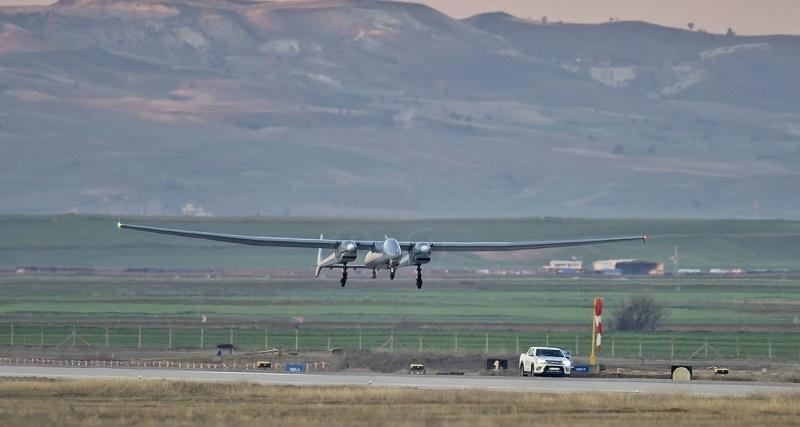The Algerian Air Force has ordered six Turkish Aksungur unmanned aerial vehicles (UAVs) from Turkish Aerospace Industries (TAI). Algeria is set to become the first export customer to use the Aksungur UAV in North Africa. The TAI Aksungur is an unmanned aerial vehicle (UAV) built by Turkish Aerospace Industries for the Turkish Armed Forces. Using existing technology from the TAI Anka series of drones, it is the manufacturer’s largest drone with payload capacity for mission-specific equipment. It is intended to be used for long-term surveillance, signals intelligence, maritime patrol missions, or as an unmanned combat aerial vehicle.
The aircraft is 12 m (39 ft) long and 3 m (9.8 ft) high when resting on its landing gear. The high-mounted wings have a slight dihedral angle and a wingspan of 24 m (79 ft). The wings end with small winglets. The centralized fuselage is under the wings and houses avionics, camera and sensors systems, with a chin-mounted camera blister. Fuel is stored in the fuselage and wings. A turbocharged engine is mounted under each wing, with the engine nacelles each extending backward into a tail boom. The tricycle landing gear retracts into the engine nacelles and the nose of the aircraft while in flight.

TAI expects to integrate weapon systems typical of F-4 and F-16 fighter aircraft onto Aksungur in the last quarter of 2019. Three hardpoints are situated under each wing for attaching external payloads, such as munitions or sonar buoys. These hardpoints are rated for loads of 150, 300 and 500 kg (330, 660 and 1,100 lb). Proposed armaments include TEBER-81 (laser-guided bomb Mk-81), TEBER-82 (laser-guided bomb Mk-82), LUMTAS, MAM-L, Roketsan Cirit, MAM-C, HGK-3 (precision-guided munition), KGK (82) (winged guided kit), and miniature bomb. Optional beyond-visual-range operation flexibility is available via communications satellite.
TAI planned to integrate weapon packages and put the Aksungur into production in early 2020. The first unit was delivered to the Turkish Naval Forces on 20 October 2021. On 2 September 2020, TAI Aksungur flew the fifty-ninth test flight by staying in the air for 49 hours. On 17 September 2020, TAI Aksungur flew at an altitude of 20,000 feet for 20 hours carrying 12 MAM-L smart munitions. TAI Aksungur carried an MK-82 bomb with a Teber guidance kit weighing 250kg and hit a target at a 30km distance. Turkey is using Aksungur for dropping Sonobuoy in the sea, in order to find the Greek submarines.















